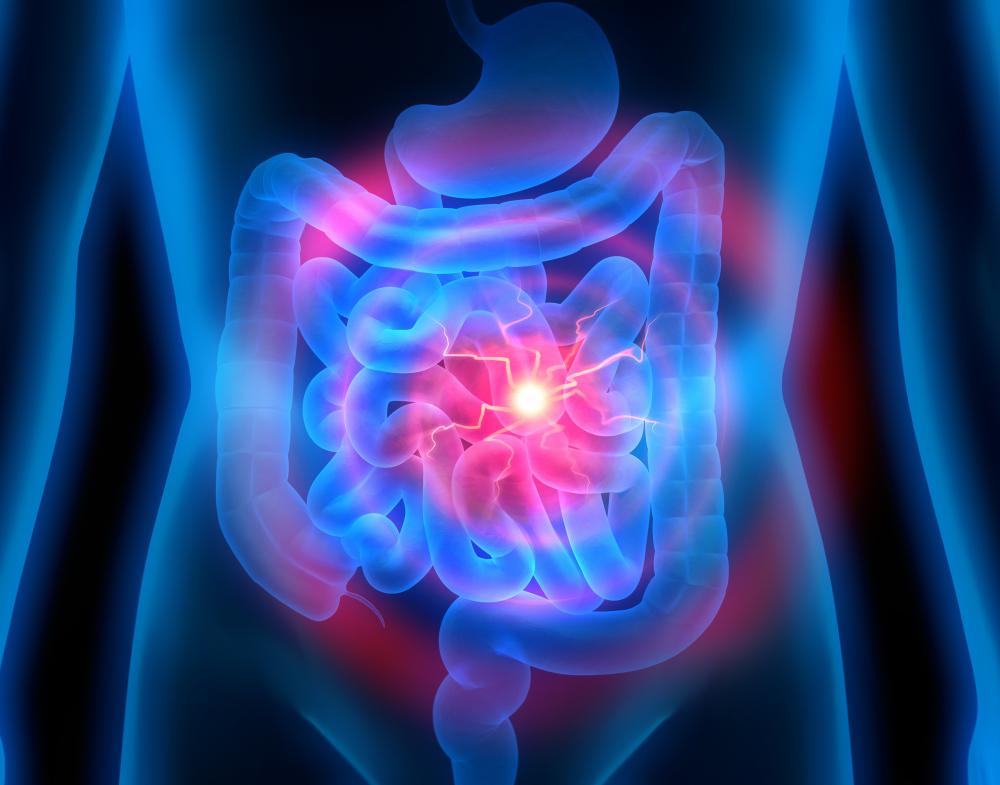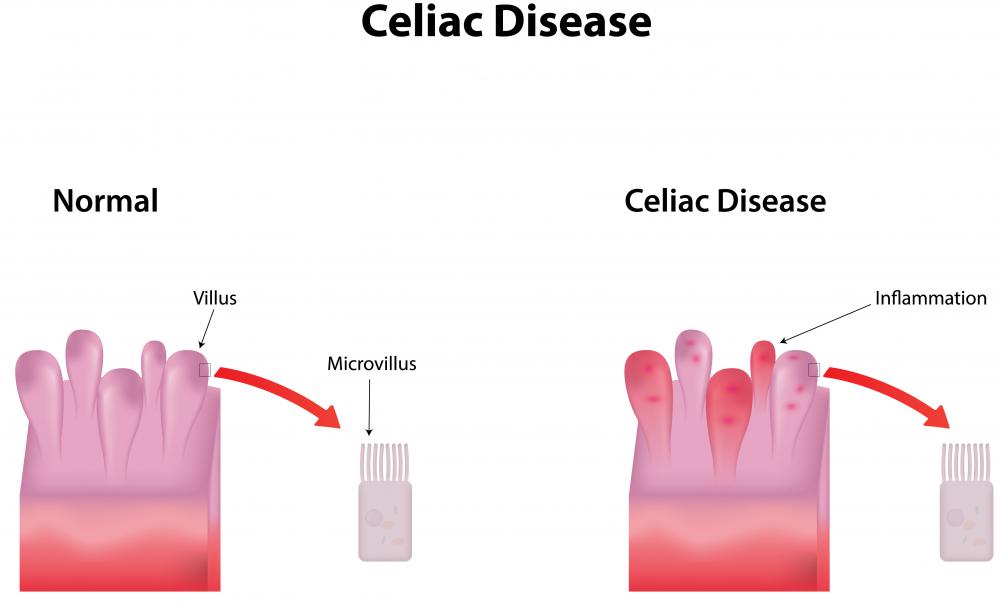At WiseGEEK, we're committed to delivering accurate, trustworthy information. Our expert-authored content is rigorously fact-checked and sourced from credible authorities. Discover how we uphold the highest standards in providing you with reliable knowledge.
What is Celiac Disease?
Celiac disease is a digestive condition in which the lining of the small intestine is damaged or destroyed and cannot normally absorb nutrients into the bloodstream. This damage is produced by an autoimmune response to eating certain types of grain protein called gluten. Found primarily in breads, pastas, and cereals, gluten is also an ingredient in many processed foods, such as soy sauce, canned soups, and ketchup. While most alcoholic beverages are gluten-free, beer must be avoided.
While some people with celiac disease may be symptom-free, most experience some type of digestive disorder, such as frequent indigestion, heartburn, acid reflux, and irritable bowel syndrome. Since the intestine cannot process food properly, weight loss and nutritional deficiencies are common. Another clear sign of this disease is dermatitis, an inflammation of the skin, and many patients suffer from fatigue and aching joints. New studies have revealed a strong link between the condition and an increased risk of osteoporosis. Calcium malabsorption also leads to dental problems, including decay and other tooth enamel issues.

There are essentially two tests used to diagnose celiac disease. The most common is an upper endoscopy, in which a plastic tube is inserted down the esophagus to take still photographs of the upper part of the gastrointestinal tract. This may also include a biopsy of the distal duodenum.
The second standard test is a serology screening, consisting of four tests looking for IgA antibodies, the presence of which indicates the disease. Medical professionals may recommend other tests, such as a full blood count or a liver enzymes count, but the two mentioned above are the standard rule for diagnosis. Because of its similarity to other ailments, this condition is frequently misdiagnosed.

There is no known direct cause for celiac disease, although scientists estimate most patients have a genetic susceptibility to the illness. The trigger could be anything from an environmental agent, to a virus, to early exposure to gluten. In fact, studies show that babies exposed to gluten early on, before the gut barrier is fully developed, have an increased risk of developing the condition later in life.

Strict adherence to a gluten-free diet is the only treatment available for celiac disease. Because there is no cure available, the dietary changes must be permanent. A gluten-free diet will result in improvements in just a few weeks, however, and if the diet is maintained, the intestine will be completely healed in about three months.
AS FEATURED ON:
AS FEATURED ON:
















Discussion Comments
Since CD is severely underdiagnosed, it is hard to be precise about how common it is.
I know a physician who was diagnosed at 80 who now had a new life because of the change to a gluten-free diet. His main comment was that he had a far greater feeling of mental clarity.
Since gluten is ubiquitous (not least in food additives and colourings) it is hard to completely eliminate it unless you really know what you are doing. If you have tried to self-diagnose by eliminating gluten, you will have to go back to a normal diet before you can be tested at all.
If you think you might have CD, see your doctor and ask about it. And if anyone in your family has CD, go today.
I have had celiac disease for many years. When looking at ingredients, avoid any products that say "modified food starch". This can be wheat-based. Or call the manufacturer and ask them. Ingredient labels are getting better about identifying the presence of gluten, but many restaurants still use flour regularly as a thickening agent and coating on food. I avoid gravy on foods, sauces and other coatings I can't identify.
Don't try to self-diagnose celiac disease, because there are other conditions that have the same symptoms. See a doctor about it.
I been suffering from stomach cramps for a long time, finally they did an endoscopy and found a possible link to celiac disease, but this week my doctor will tell me whether I have it or not based on my antibody test.
I just can't believe I have been suffering for several years and no doctor have linked my symptoms to celiac disease, so I hope this is it, so I can take care of myself.
To the person who is still having the stomach cramps- try cutting out other items in addition to gluten. I would suggest starting with dairy.
I believe some vinegar contains gluten and there is vinegar in ketchup.
This article says that gluten is found in ketchup. I clicked the link but found no reference to gluten or any gluten containing ingredients. I have celiac and have never had a problem with ketchup.
Turns out, Celiac Disease is actually very common. about 1 in 133 people have it. That sounds pretty common to me. With that said, I would like to add, we are lucky it is common, as there are more and more great alternative recipes out there now.
I was told I have Celiac Disease. As soon as I stopped eating Gluten in May I have felt better. But I wake up and go to bed with a stomach ache. Is this normal? I can feel that it is my small intestine. What can I do to make it better?
Luckily celiac disease is not that common. For example in United States, about one percent of population suffers from celiac disease.
Symptoms can also include stomach pain, fatigue, even depression. A good way to test sensitivity to gluten is eliminating it from diet all together. If symptoms subside, start slowly adding gluten, little by little, if symptoms return it is a pretty good proof that gluten is the culprit.
Post your comments